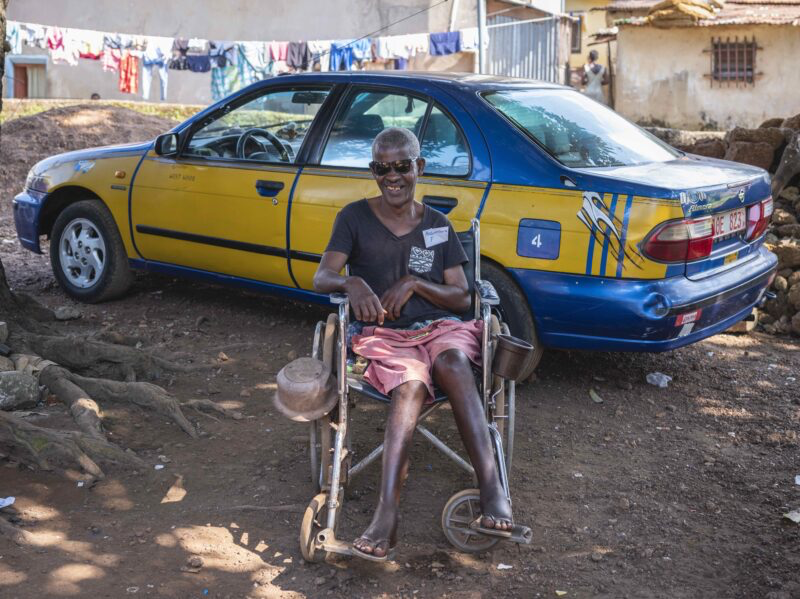Celebrating International Disability Day in Sierra Leone
On International Disability Day, new research finds that access to healthcare – especially assistive technology - and inclusive mobility are top aspirations for communities living in informal settlements in Freetown.

Asumana, a resident in Thompson Bay, Freetown, Sierra Leone. Photo credit: Angus Stewart
This is Asumana is an older resident in Thompson Bay informal settlement in Freetown, Sierra Leone. About 6,000 people live in Thompson Bay, building out into the sea on sandbags as each newcomer claims the land in front of the previous.
They live without access to proper water or sanitation, for example, there are no sanitary toilets or any rubbish collection, and there are no proper roads into or around the settlement which makes it makes it very inaccessible.
Asumana relies on his family, his neighbours and his very old wheelchair, which someone he knows found several years ago, to get around. If Asumana wants to leave the settlement he has to take expensive transport like this taxi, which he chose to be photographed with, which he cannot often afford to do.
Despite the poor quality of his wheelchair Asumana is one of only 24 people we found who had access to any type of Assistive Technology (out of over 2,460 people who needed it in some form) when undertaking the World Health Organisation’s Rapid Assistive Technology Survey in Freetown this Autumn, and he was an active participant in our research.
I had the chance to join the last few weeks of the AT2030 programme in Freetown and this week we celebrated International Disability Day (as it is called in Sierra Leone) with the communities for the first time.
Our research was conducted with the Sierra Leone Urban Research Centre (SLURC) and led by the Development Planning Unit (DPU) at University College London (UCL).
We were lucky to have Dr Ignacia Ossul leading this programme in Sierra Leone. It found that inclusive mobility and access to healthcare - including assistive products like wheelchairs, eyeglasses, walking sticks and prosthetic limbs - are the top priorities for the communities of Dworzark and Thompson Bay settlements – showing that the priorities for disabled people align almost exactly with the priorities for settlement-dwellers as a whole (though the challenges are different and can be much greater for disabled residents like Asumana).
In Sierra Leone I’m pleased to say we have also been able to support a Country Capacity Assessment on Assistive Technology at a country level, working with the Ministry of Health, which has been led by the brilliant Susanne Schroder and her team at Clinton Health Access Initiative (CHAI) Sierra Leone.
Their work is being supplemented by further research from the DPU being led by Associate Professor Julian Walker, who is investigating provision of Assistive Technology through the informal market (for example in Asumana’s case and lots of other residents in Sierra Leone), which will report back early next year.
We began the qualitative research in both settlements in September and it was delivered with the Federation of the Urban and Rural Poor (FEDURP) and included one of the first global trials of the World Health Organisation’s (GATE team’s) new Rapid Assistive Technology Assessment (RATA) tool.
The survey found that almost 5% of the people surveyed had ‘a lot of difficulties’ for example in seeing, walking, hearing or remembering, which would indicate that they are people with disabilities. Of that group, none of those with severe difficulties had access to assistive technology, and only 20% of those with a lot of difficulties had access, with many of the existing assistive products being of a very low quality.
The most frequent reason given for lack of assistive products was lack of affordability and also a lack of information on how and where to get them.
This week, on 2nd and 4th December, the communities held two final events to share their findings with stakeholders and leaders in the community and to celebrate International Disability Day with distinguished guests.
For most participants, this is the first time they have been involved in anything that viewed disability positively and the theme this year was perfect: ‘the future is accessible’.
We were lucky to have Dr Abs Dumbuya - Loughborough alumni, adopted Brit and passionate Sierra Leonean disability activist- to share the day with us. Chairman of the Freetown Cheshire Home, and a consultant on the project, he talked about the importance of ensuring every Sierra Leonean has access to education, good living conditions and healthcare, and recognized that for disabled people living in informal settlements this is especially important. Yirah Oryanks Conteh, Chair of FEDURP also spoke passionately.
Although FEDURP – part of Slum Dwellers International – has been working in the communities organising and supporting savings groups for some time, Yirah made a new commitment to ensure all of their work is inclusive and to bring disabled people into their organising structure. No small commitment for an organisation built on the voluntary time of slum dwellers fighting for their own futures.
For me, this was a real moment of reflection on where we are headed with the AT2030 programme. Many of those present were participating for the first time and simply the process of collective engagement had helped them to overcome shame and stigma.
They loved the images taken by the immensely talented Angus Stewart and the event made the front page of a newspaper in Freetown.
Assistive Technology is part of a much bigger issue, but access is still vital.
I’m so grateful that our UK Aid funding allows us to work in this flexible way with slum-dwellers as well as tackling the systems and governments that need change; because there definitely is energy and innovation here.
Phase Two of the project is to work with the communities to co-design innovative interventions to address the aspirations they have raised and I’m looking forward to heading back to Sierra Leone in 2020 to see what their disability innovation looks like.